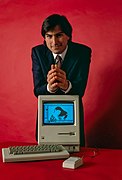Portal:Internet
The Internet PortalThe Internet (or internet) is the global system of interconnected computer networks that uses the Internet protocol suite (TCP/IP) to communicate between networks and devices. It is a network of networks that consists of private, public, academic, business, and government networks of local to global scope, linked by a broad array of electronic, wireless, and optical networking technologies. The Internet carries a vast range of information resources and services, such as the interlinked hypertext documents and applications of the World Wide Web (WWW), electronic mail, telephony, and file sharing. The origins of the Internet date back to research that enabled the time-sharing of computer resources and the development of packet switching in the 1960s. The set of rules (communication protocols) to enable internetworking on the Internet arose from research and development commissioned in the 1970s by the Defense Advanced Research Projects Agency (DARPA) of the United States Department of Defense in collaboration with universities and researchers across the United States and in the United Kingdom and France. The ARPANET initially served as a backbone for the interconnection of regional academic and military networks in the United States to enable resource sharing. The funding of the National Science Foundation Network as a new backbone in the 1980s, as well as private funding for other commercial extensions, encouraged worldwide participation in the development of new networking technologies and the merger of many networks using DARPA's Internet protocol suite. The linking of commercial networks and enterprises by the early 1990s, as well as the advent of the World Wide Web, marked the beginning of the transition to the modern Internet, and generated sustained exponential growth as generations of institutional, personal, and mobile computers were connected to the network. Although the Internet was widely used by academia in the 1980s, the subsequent commercialization in the 1990s and beyond incorporated its services and technologies into virtually every aspect of modern life. (Full article...) Selected article
The AACS encryption key controversy, also known as the AACS cryptographic key controversy, arose in April 2007 when the Motion Picture Association of America and the Advanced Access Content System Licensing Administrator, LLC (AACS LA) began issuing demand letters to websites publishing a 128-bit number, represented in hexadecimal as 09 F9 11 02 9D 74 E3 5B D8 41 56 C5 63 56 88 C0 (commonly referred to as 09 F9), which is one of the cryptographic keys for HD DVDs and Blu-ray Discs. The letters demanded the immediate removal of the key and any links to it, citing the anti-circumvention provisions of the U.S. Digital Millennium Copyright Act (DMCA). In response to widespread internet postings of the key, the AACS LA issued various press statements, praising those websites that complied with their requests as acting in a "responsible manner", warning that "legal and technical tools" were adapting to the situation. The controversy was further escalated in early May 2007, when aggregate news site Digg received a DMCA cease and desist notice and then removed numerous articles on the matter and banned users reposting the information. This sparked what some describe as a digital revolt, or "cyber-riot", in which users posted and spread the key throughout the internet en masse. The AACS LA described this situation as an "interesting new twist".
Selected picture A hotspot is a venue that offers Wi-Fi access. The public can use a laptop, WiFi phone, or other suitable portable device to access the Internet. Of the estimated 150 million laptops, 14 million PDAs, and other emerging Wi-Fi devices sold per year for the last few years, most include the Wi-Fi feature. News
Wikinews Internet portal
WikiProjects
Did you know (auto-generated) -
Selected biography
Margaret C. "Meg" Whitman (born August 4, 1956) has been the President and CEO of the online marketplace eBay since March 1998. Whitman joined eBay when the company had 29 employees and operated solely in the United States; eBay is now a global organization with over 11,000 employees. In addition to managing eBay, she currently serves on the Board of Directors of Procter & Gamble and DreamWorks Animation. According to Forbes magazine, Whitman was worth an estimated $1.4 billion in 2007. She is one of only seven women to have been repeatedly ranked among the world's most influential people by Time magazine.
General images -The following are images from various internet-related articles on Wikipedia.
Selected quoteMore Did you know...
Main topics
Featured contentCategoriesRelated portalsThings you can do
Associated WikimediaThe following Wikimedia Foundation sister projects provide more on this subject:
Wikipedia's portals |





















































